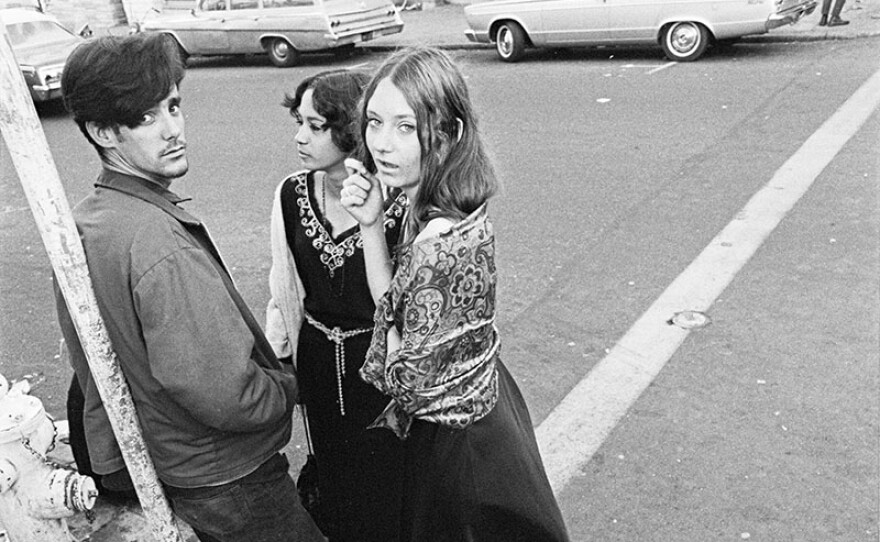—Revisit the Summer of 1967 When Thousands of Young People Flocked to San Francisco’s Haight Ashbury—
AMERICAN EXPERIENCE presents “Summer Of Love,” a striking look at the social and cultural forces that sparked the largest migration of young people in America’s history.
From its utopian beginnings, when peace and love prevailed, to the chaos, unsanitary conditions and widespread drug use that ultimately signaled the end, Academy Award-nominated filmmakers Gail Dolgin and Vicente Franco (“Daughter From Danang”) revisit a fleeting moment in time which still resonates to this day.
“Many of these idealistic youth were products of the 1950s with its confusing mix of post-war affluence and the threat of nuclear annihilation,” said Dolgin. “San Francisco, in 1967, seemed like mecca, the center of a visionary new society — one that rejected war, hatred, conformity and money. The Haight Ashbury, for a brief period, was the playing field for a new way of life.”
In January 1967, the thousands of youth already in San Francisco descended on Golden Gate Park for a Human Be-In.
The media flocked to the event, putting hippies in the national spotlight for the first time. And once the press offered a window into the world of Haight Ashbury, even more young people flooded in.
The new arrivals were looking to “turn on, tune in, and drop out,” the popular refrain that offered people a mind-blowing new experience courtesy of LSD.
“We really thought that drugs were going to change the world,” recalls Mary Kasper, who was in the Haight from the start of the movement. “We thought if you turned on, if you took acid, you would really change, because we had changed from those experiences of cosmic oneness.”
San Francisco was fast becoming an outdoor society where free music was as readily available as free love.
The Grateful Dead became the poster children for a generation, offering free concerts to anyone who wanted to listen.
But along with free music, free love and “cosmic oneness,” the onslaught of people also brought a lack of housing, shortage of food, rampant drug problems and sexually transmitted diseases.
Free clinics and soup kitchens tried to keep up with the massive population, estimated to be from fifty thousand to one hundred thousand at its peak.
The Haight soon became a caricature of its idealistic beginnings, as sightseeing buses crawled through the area and shops and restaurants sprung up catering to souvenir hungry tourists and “weekend hippies.”

College students with no intention of “dropping out” took on hippie personas for the summer. Hundreds of young runaways wandered the streets aimlessly.
For many, the center of the counterculture no longer seemed a shimmering wonderland. By fall, the numbers began to drop as precipitously as they had grown.
The Summer of Love was a fleeting moment in the turbulent history of the 1960s. But its underlying message left an indelible impression on those who witnessed it.
“So many of those things from that time have stayed with me, certainly the importance of community,” said Kasper. “I thought we could change the world, and I thought we could make it a better place. And I think in some ways we succeeded.”
“1967 represents a touchstone and a turning point for so many people,” said AMERICAN EXPERIENCE Executive Producer Mark Samels. “The Summer of Love was the moment when hippies — and all the beliefs they represented — took center stage and became a cultural phenomenon.”

Originally broadcast in 2007.
WATCH ON YOUR SCHEDULE:
This full episode is available to stream on demand with KPBS Passport, video streaming for members ($60 yearly) using your computer, smartphone, tablet, Roku, AppleTV, Amazon Fire or Chromecast. Learn how to activate your benefit now.
JOIN THE CONVERSATION:
AMERICAN EXPERIENCE is on Facebook, Instagram, Tumblr, and you can follow @AmExperiencePBS on Twitter. #AmericanExperiencePBS
CREDITS:
A Franco Dolgin Productions film for AMERICAN EXPERIENCE in association with KQED. Written, Produced and Directed by Gail Dolgin and Vicente Franco. Edited by David Espar. Assistant Editor: Lawrence Lerew. Associate Producer: Lynn Adler. Cinematography: Vicente Franco. Music by Gary Lionelli. Narrated by David Ogden Stiers. AMERICAN EXPERIENCE is a production of WGBH Boston. Senior Producer is Susan Bellows and Executive Producer is Mark Samels.





